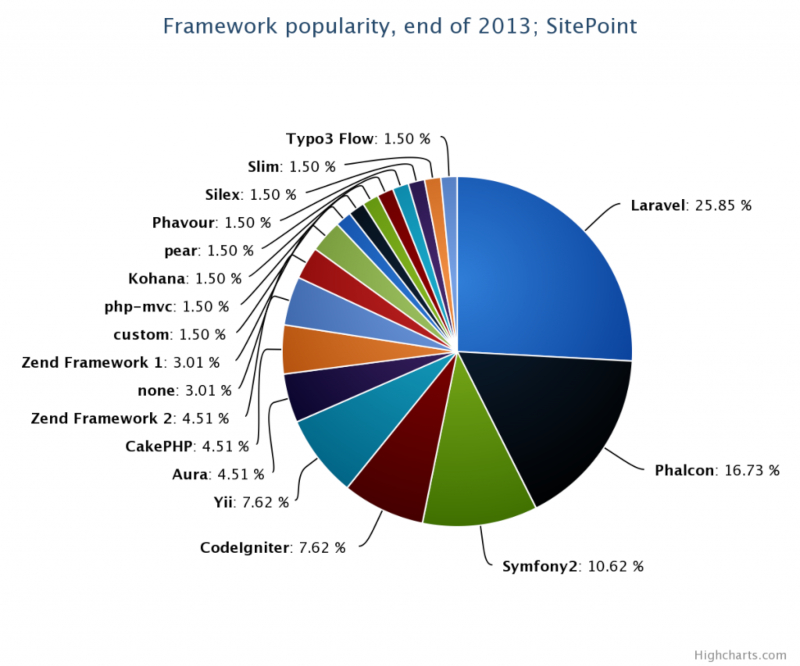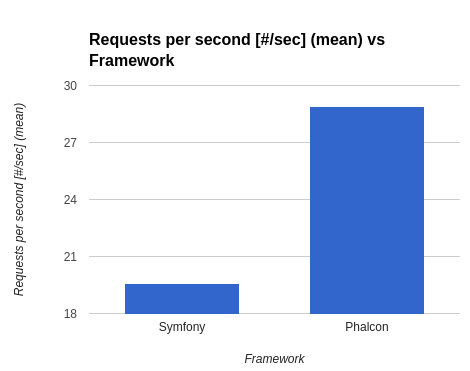The battle between Laravel and other PHP frameworks and which one is taking the cake?
Amid soaring internet availability, business owners have started relying more on websites and mobile apps to uptrend the sales.
And considering the people and their approach to buy service or product, their strategy is absolutely right.
Business owners prepare their businesses to lock horns with user preference by hiring app or web development companies to expand the reach of their business.
Currently, there are a lot of technologies available in the market which help mobile and web development companies to build very responsive and engaging web or mobile applications. However, their most preferred technology is PHP as it lets developers select the framework from many available options.
Talking about the PHP framework, it provides structure. By using a reliable PHP framework, developers can save a lot of time as the framework suggests some parts of code and packages of framework handle complex task with only a few lines of code. PHP is having more than 10 frameworks but PHP Laravel is the most useful and widely used framework.
Following pie chart clearly depicts that almost 26% of the PHP sites have been developed using the Laravel framework. Phalcon and Symfony are also very serviceable frameworks, but not as much as Laravel.

The same graph also makes us think about the reasons why Laravel is winning the battle. So, now let’s compare these 3 very popular frameworks and reveal the reasons behind the popularity of Laravel.
Laravel VS Phalcon VS Symfony
For a better understanding, first, we will compare Phalcon with Symfony and then we will compare the winner of round 1 with Laravel to find out the ultimate winner.
Round 1: Symfony VS Phalcon
- Symfony is the open-source framework, released under the MIT licence.
- Phalcon is also the open-source software, but it is released under the BSD licence. Both MIT and BSD licences are identical. But unlike MIT licensed product, products which are released under some version of BSD licence require you to include disclaimer while using or redistributing them.
- One of the major advantages of using Symfony is its large plugin ecosystem. Developers can use it easily and complete the development phase of the software development life-cycle too quickly.
- Phalcon does not have a highly active community which provides many plugins. However, Phalcon is built in C and because of it, it is by default fast.
- After using Symfony, a developer can be a good programmer as Symfony teaches him service-oriented architecture, dependency injection and many more.
- To use Phalcon, you have to be a good programmer as it is a bit complex framework.
- With too many configurations, setting up the Symfony is a tedious process.
- Phalcon offers very flexible setting process. You can set up the base project the way you want.
- Symfony is equipped with the inbuilt debugger. Which means, developers can debug the program as easy as pie.
- Phalcon is written in C and so, to decode a program written in Phalcon, one should have knowledge about C language.
- You need to play around 5 files to write simple code ‘hello world’.
- The code written in Phalcon is clean and light.
- Symfony comes with a great templating engine, Twig. It can also be used outside the framework.
- Phalcon also owns its own templating engine, volt. One cannot use Volt outside the framework, but compared to Twig, it has clear and understandable syntax. It is also really fast.
- Symfony cannot handle as many requests as Phalcon at a given time. If we give 1000 requests along with 100 concurrent connections, Symfony can process only 20 requests per second, whereas Phalcon can process 29 requests per second.

Here, if you have noticed, Symfony is leading in all minor factors, but when it comes to major factors such as speed, templating engine, code structure, and configuration process which actually influence the program directly, Phalcon is leading. Thus, the winner of round 1 is Phalcon!
Now, as we have planned, let’s compare the Phalcon with Laravel. We will compare these two frameworks on the bases of some new as well as already mentioned factors.
Round 2: Phalcon VS Laravel
- Phalcon is the fastest PHP framework as it is built using C which is fast and efficient.
- Compared to Phalcon, Laravel is a bit slow as it is built using PHP itself.
- The documentation of Phalcon is poor. It misses a lot of information.
- The documentation of Laravel is extensive. It includes every single thing.
- It isn’t easy to write the code for authentication in Phalcon.
- Laravel offers Auth class out of the box. With this class, a developer can easily define the users and give them access according to their roles. This is a fundamental requirement of all ERP software.
- Phalcon has more powerful templating engine than Symfony, but not as powerful as Laravel.
- Laravel’s template system which is called Blade, uses PHP code directly in the view and because of this, it is faster than the template system of Phalcon.
- One should have exceptional knowledge of programming to use Phalcon.
- Laravel is really easy to use. With its thousands of packages, developers can develop web and mobile applications in Laravel with less knowledge of syntax and in less time.
- Code written in Phalcon is light and clean.
- While using Laravel, developers have the freedom to structure the program as they want.
- Phalcon isn’t armed with the inbuilt debugger. Also, developers need to have knowledge of the C programming language to debug a program in Phalcon.
- Laravel has the package named Heuvie which enables developers to debug the program easily.
- It is a complex process to test the program using Phalcon framework.
- Laravel provides an in-built testing tool named Laravel Dusk which is developed for program testing.
- Only with root access, Phalcon can install PHP.
- Laravel has already been developed using PHP. So, it does not encounter such problem.
After reading so far, you might have already identified the winner. Yes, it is Laravel. Though Laravel is a bit slower than Phalcon, it is leading all other factors which make it an ultimate winner.
Conclusion
Frameworks are undoubtedly making PHP the first choice to develop mobile and web applications. A framework does not only save time and cost, but it lets business owners deploy website or app quickly. Phalcon, Symfony and Laravel are the three most popular PHP frameworks. In between Phalcon and Symfony, one should always opt for Phalcon. But since Phalcon doesn’t have too many plugins like Symfony, choose Phalcon only if you are developing a small program and time isn’t your driving factor. However, Laravel is a better option than Phalcon. Laravel has all important in-built tools along with all necessary packages and it is also not as slow as Symfony.
Related Posts
As the world of eCommerce continues to evolve, businesses are constantly seeking ways to stand out in the digital landscape. According to a report by Statista, it is predicted that global online sales will reach an impressive mark of $6.5 billion by 2023.
For startups in 2024, there are few aspects as important as web development.
Free webinars can be one of the most effective ways to market your brand or product.
As the internet continues to expand and businesses attempt to reach their customers online, having a great website is essential.
Staying up-to-date on the latest website trends is vital for business owners.

















Comments
comments powered by Disqus